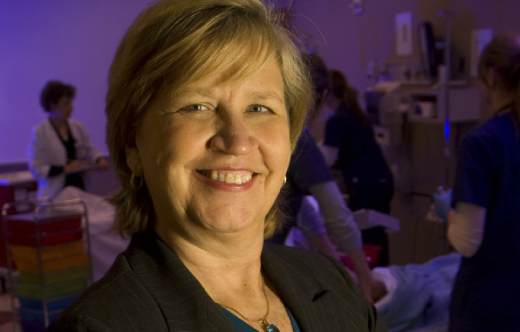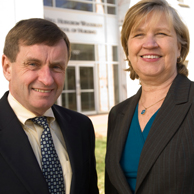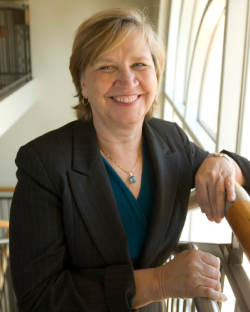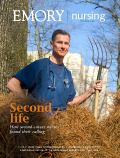A new dean comes to town

by Kay Torrance
Linda McCauley takes on the School of Nursing.
Last year, some of Linda McCauley’s colleagues at the University of Pennsylvania asked her how the nursing school could better recruit the best doctoral students. Without hesitating, she replied, “We’re sitting on them. They’re our undergraduates.” Emory’s School of Nursing is too, she believes.
One of the items on McCauley’s to-do list as the new dean of the School of Nursing is to increase its PhD candidates. (McCauley became the new dean on May 1 after Marla Salmon left to become the dean of the University of Washington nursing school last fall.) She wants undergraduates to know that research doesn’t always entail working with test tubes or sitting in front of a computer all day—not that there is anything wrong with that, she says.
Her own research, for example, centers on the effects of pesticides on migrant farm workers. She has gone into the homes and fields of migrant farm workers to study them—engaging in one-on-one interaction, as she did in her days in patient care.
“Students get mesmerized by clinical care,” she says. “Research is fascinating and rewarding too. I want to set a goal of enrolling two students each year to go from BSN into the doctorate program. But we need to educate students as freshman and sophomores in college about nursing science. If we wait until they are juniors and seniors, their schedules have become so tight that they don’t even want to think about staying in school longer.”
Her venture into environmental health research developed from seeing a grant application in the mid-1990s for research involving migrant farm workers. She was studying Gulf War veterans while at the Oregon Health & Science University when she met Juanita Santana, who directed a local Head Start program for children of migrant farm workers.
|
||||
Together they worked on a five-year study about pesticide exposure. McCauley formulated the study parameters, and Santana provided a gateway into a population that often feared outsiders. The study raised the ire of some growers, but the researchers were able to bring them onboard by appointing them to the study’s advisory committee. Soon the growers wanted their own children and homes tested for exposure.
“The study was so successful because Linda was very responsive to the issues in the community, rather than coming in and saying this is what I want to work on,” Santana says. “She really listened to the people. She cared about them, and not a lot of people are interested in working with this population.”
 |
Nursing always has been at the center of public health, both philosophically and in practice. Public health nurses are leaders in communities worldwide in assessing health needs and providing care and preventive services. Through their commitment to excellent care and social justice, nurses are crucial to improving the health of all populations. —James Curran, dean of the Rollins School of Public Health, and co-chair of the search committee for the nursing school dean |
|||
Since then, McCauley has published extensively on pesticide exposure and migrant farmworkers—particularly young Hispanic males—including the biomarkers of pesticide toxicity, neurobehavioral performance after exposure, and knowledge about safe-worker protections. She’s currently seeking a grant for a study on pesticide exposure and pregnant farmworkers, in collaboration with Maureen Kelley, a midwife and chair of the school’s family and community nursing department—a fact that initially didn’t sit well with the farmworkers.
“I told them that we have to bring health care providers into this because we will be studying pregnancy,” McCauley says. “We have to make sure the women get prenatal care. They were hesitant; they don’t trust outsiders.”
McCauley has learned over the years that she has to walk a fine line to study the community. In other areas, though, she’s more outspoken—her students have even told her that she’s “too political.” She recently told undergraduate students in her community health course that nurses must address health care challenges not only through practice but advocacy.
She pointed to a recent news story to illustrate her point: Children were coming into the Children’s Hospital of Philadelphia with gunshots wounds at an alarming frequency. The trauma doctors had mobilized and spoken to the media about the issue. The mayor’s office was getting involved. But where were the nurses?
“Where is nursing’s collective voice in stopping the shooting of children?” she asks. “It’s okay to patch and heal them, but why is nursing silent? Before I retire, I want to see nursing speaking in a collective voice. Nursing is the most trusted profession and the largest in health care, but we don’t go to the table. And we don’t teach nursing students to join collectively to have a voice.”
Linda McCauley's punch list1. Recruit faculty 2. Start new programs of research, perhaps in palliative care or mental health 3. Expand the Lillian Carter Center for International Nursing 4. Increase the number of doctoral students 5. Increase clinical placement opportunities and partnerships |
||||
She has taken a backseat approach, though, with the migrant farmworker community.
I've had colleagues say to me,"How can you not report a housing violation?," she says. “It’s not my call to make. It’s the community’s. If I go onto a farm, for example, and see a housing violation, the camp could be shut down, and families would be homeless. Then that creates a whole new set of problems. It’s not as simple as it might seem.”
McCauley says community-based research is one of the hardest types to do but also one of the most personally satisfying because it brings attention to an underserved population. She hopes she can be an example to faculty and students of the nursing school.


 In the beginning
In the beginning